July 1, 2020
About four-in-ten U.S. adults say it has become more common for people to express racist views toward Asians since the pandemic began
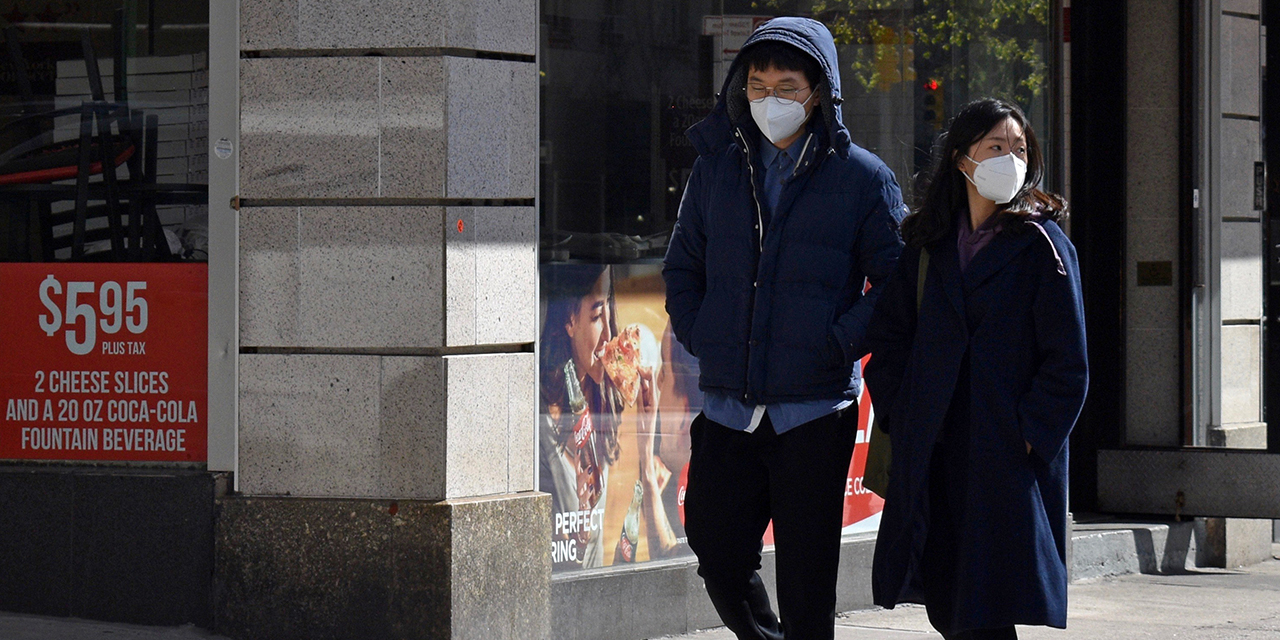
A couple in face masks walk in a New York City street during the COVID-19 pandemic. (Maria Khrenova\TASS via Getty Images)
How we did this
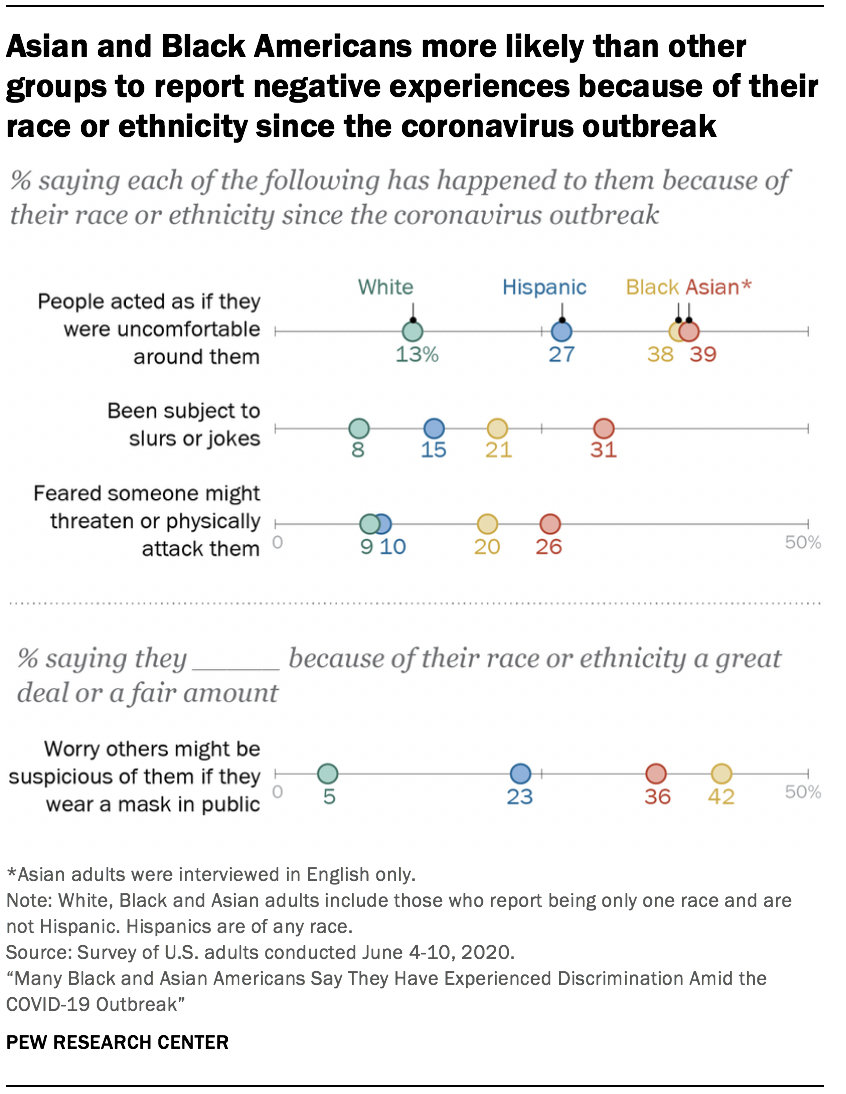 The coronavirus outbreak continues to have far-reaching health and economic consequences for the American public. But for many, especially Black and Asian Americans, the effects extend beyond medical and financial concerns. About four-in-ten Black and Asian adults say people have acted as if they were uncomfortable around them because of their race or ethnicity since the beginning of the outbreak, and similar shares say they worry that other people might be suspicious of them if they wear a mask when out in public, according to a new Pew Research Center survey.
The coronavirus outbreak continues to have far-reaching health and economic consequences for the American public. But for many, especially Black and Asian Americans, the effects extend beyond medical and financial concerns. About four-in-ten Black and Asian adults say people have acted as if they were uncomfortable around them because of their race or ethnicity since the beginning of the outbreak, and similar shares say they worry that other people might be suspicious of them if they wear a mask when out in public, according to a new Pew Research Center survey.
Black and Asian Americans are also more likely than their white and Hispanic counterparts to say they have been subject to slurs or jokes because of their race or ethnicity, but Asian adults are the most likely to say this has happened to them since the beginning of the coronavirus outbreak. About three-in-ten Asian adults (31%) say they have been subject to slurs or jokes because of their race or ethnicity since the outbreak began, compared with 21% of Black adults, 15% of Hispanic adults and 8% of white adults. This aligns with some reports of incidents of discrimination against Asian Americans since the virus outbreak first emerged in China and then started spreading in the United States.
At the same time, about half of Black Americans (51%) say they have heard expressions of support because of their race or ethnicity since the coronavirus outbreak; about three-in-ten Hispanic (29%) and Asian (28%) adults say the same. The survey was conducted during a time when demonstrations continued across the country to protest the death of George Floyd, a Black man killed while in Minneapolis police custody.
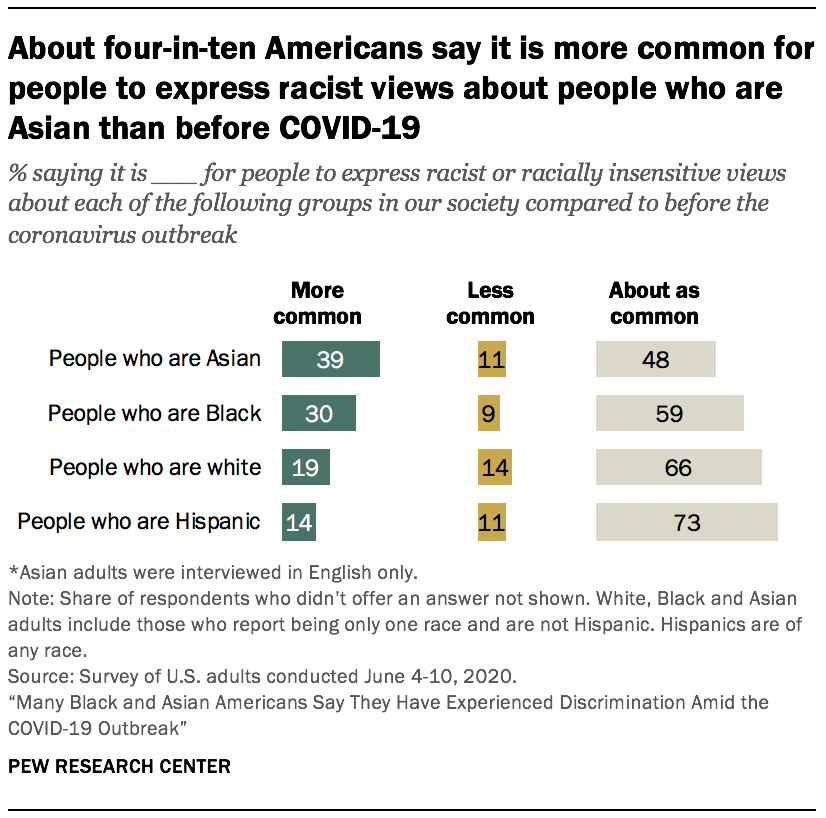 Beyond the personal experiences of various groups, about four-in-ten U.S. adults (39%) say it is more common for people to express racist or racially insensitive views about people who are Asian than it was before the coronavirus outbreak, while 30% say it has become more common for people to express these views toward people who are Black. Smaller shares say that, compared with before the outbreak, it is more common for people to express racist or racially insensitive views about people who are Hispanic (19%) or white (14%). Asian Americans, who account for 6% of the U.S. population, are the fastest growing major racial or ethnic group in the U.S. Hispanics make up 18% of the population overall, while Black Americans are 12%.
Beyond the personal experiences of various groups, about four-in-ten U.S. adults (39%) say it is more common for people to express racist or racially insensitive views about people who are Asian than it was before the coronavirus outbreak, while 30% say it has become more common for people to express these views toward people who are Black. Smaller shares say that, compared with before the outbreak, it is more common for people to express racist or racially insensitive views about people who are Hispanic (19%) or white (14%). Asian Americans, who account for 6% of the U.S. population, are the fastest growing major racial or ethnic group in the U.S. Hispanics make up 18% of the population overall, while Black Americans are 12%.
A majority of Asian adults (58%) say it is more common for people to express racist or racially insensitive views about people who are Asian than it was before the coronavirus outbreak; roughly four-in-ten white, Black and Hispanic adults say this is more common now. A sizable share of Black adults (45%) also say it is more common for people to express racist views about Black people than before the outbreak, more than the shares of white, Hispanic and Asian adults who say the same.
These are among the findings of a Pew Research Center survey of 9,654 U.S. adults conducted from June 4-10, 2020, using the Center’s American Trends Panel.
A note about the Asian sample
Asian and Black Americans are more likely to report adverse experiences due to their race or ethnicity since the pandemic began
About four-in-ten Asian (39%) and Black (38%) adults – and 27% of Hispanic adults – say someone has acted uncomfortable around them because of their race or ethnicity since the coronavirus outbreak. Only 13% of white adults say this has happened to them.
When asked about other negative situations they may have experienced because of their race or ethnicity since the pandemic, Asian and Black adults are more likely than Hispanic and white adults to say that they have been the subject of slurs or jokes or feared someone might threaten or physically attack them because of their race or ethnicity.
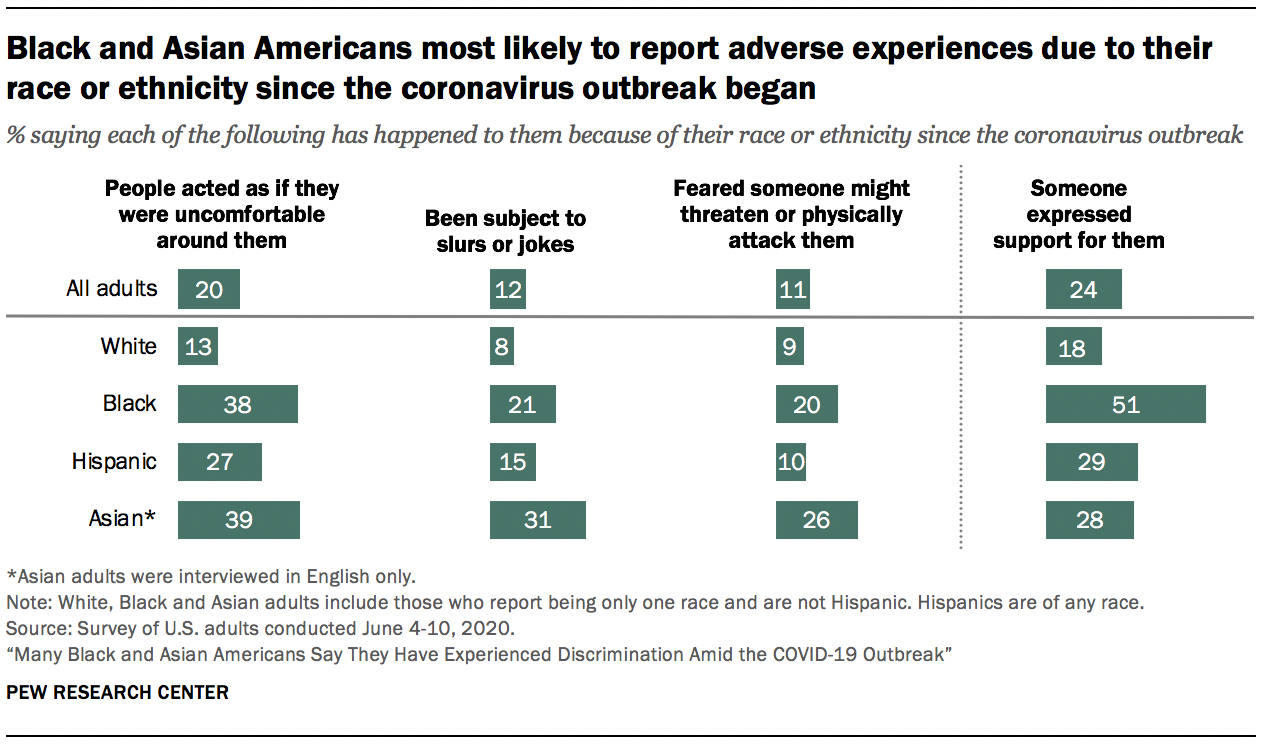
Asian Americans are more likely than any other group to say they have been subject to slurs or jokes because of their race or ethnicity since the coronavirus outbreak: 31% say this has happened to them, compared with 21% of Black adults, 15% of Hispanic adults and 8% of white adults. About a quarter (26%) of Asian Americans and 20% of Black Americans say they feared someone might threaten or physically attack them, more than the shares of white and Hispanic Americans.
Black adults younger than 50 are more likely than older Black adults to say they have had each of these experiences. For example, 44% of Black adults in the younger age group say people have acted as if they were uncomfortable around them since the pandemic began, compared with 30% of Black adults ages 50 and older. About three-in-ten Black adults under 50 (28%) say they have feared someone might threaten or physically attack them (vs. 9% of older Black adults) and 25% say they have been subject to slurs or jokes because of their race or ethnicity since the coronavirus outbreak (vs. 15%).
Black men (49%) are more likely than Black women (31%) to say someone acted as if they were uncomfortable around them. Black men are also more likely to say they have feared being threatened or physically attacked because of their race or ethnicity (27% vs. 15% of Black women).
The survey also asked about expressions of support since the coronavirus outbreak. About half of Black adults (51%) say someone has expressed support for them because of their race or ethnicity during this period, more than any other racial group. In particular, younger Black adults say they received this support (55% vs. 44% among those ages 50 and older). This survey was conducted at a time when Americans were following news coverage of George Floyd’s killing while in custody of Minneapolis police nearly as closely as they were following news related to COVID-19.
Sizable shares of Black and Asian adults say they worry other people might be suspicious of them if they wear a mask in public
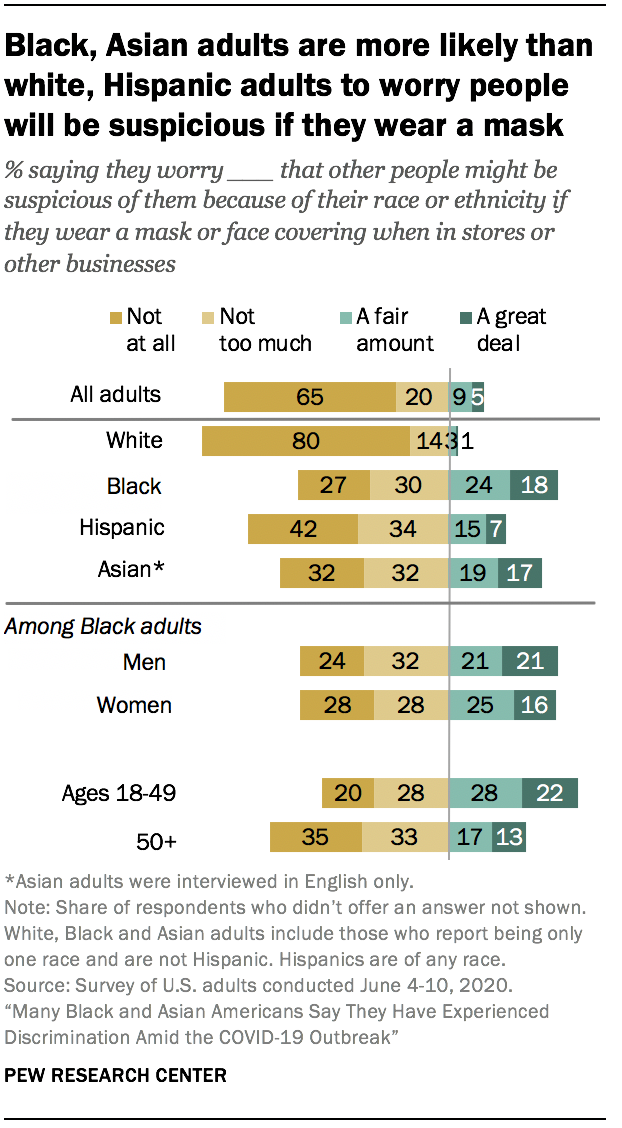 About four-in-ten Black Americans (42%) and 36% of Asian Americans say they worry a great deal or a fair amount that other people might be suspicious of them because of their race or ethnicity if they wear a mask or face covering when in stores or other businesses. About a quarter of Hispanic adults (23%) and just 5% of white adults say they worry about this.
About four-in-ten Black Americans (42%) and 36% of Asian Americans say they worry a great deal or a fair amount that other people might be suspicious of them because of their race or ethnicity if they wear a mask or face covering when in stores or other businesses. About a quarter of Hispanic adults (23%) and just 5% of white adults say they worry about this.
Despite these concerns, majorities of Black (69%) and Asian (80%) adults – as well as white (62%) and Hispanic (74%) adults – say they’ve worn a mask or a face covering all or most of the time in the past month when out in stores or other businesses.
Black men and women are about equally likely to say they worry that other people might be suspicious of them because of their race or ethnicity if they wear a mask or a face covering in stores or other businesses. About four-in-ten in each group say they worry at least a fair amount, with 21% of Black men and 16% of Black women saying they worry a great deal (this 5 percentage point difference is not statistically significant).
Concern among Black adults varies considerably by age. About half of Black Americans younger than 50 (51%) say they worry about people being suspicious of them because of their race or ethnicity if they wear a mask or face covering; 30% of Black adults ages 50 and older say the same.
Three-in-ten or more U.S. adults say racist views about Asian and Black Americans are more common than before the pandemic
A majority of Asian Americans (58%) and 45% of Black Americans say that it is more common for people to express racist views toward their group since the coronavirus outbreak. Smaller shares of Hispanic (21%) and white (18%) Americans say the same about people expressing racist views toward people who are Hispanic or white, respectively.
Age and education are linked to differing perceptions of whether racist views toward Asians are now more common. About half of younger adults ages 18 to 29 (51%) say that racist views about Asian people are more common now since the coronavirus outbreak, compared with about four-in-ten or fewer among those in older age groups. Those with college degrees or more (47%) also are more likely than those with some college or less education (35%) to say the same.
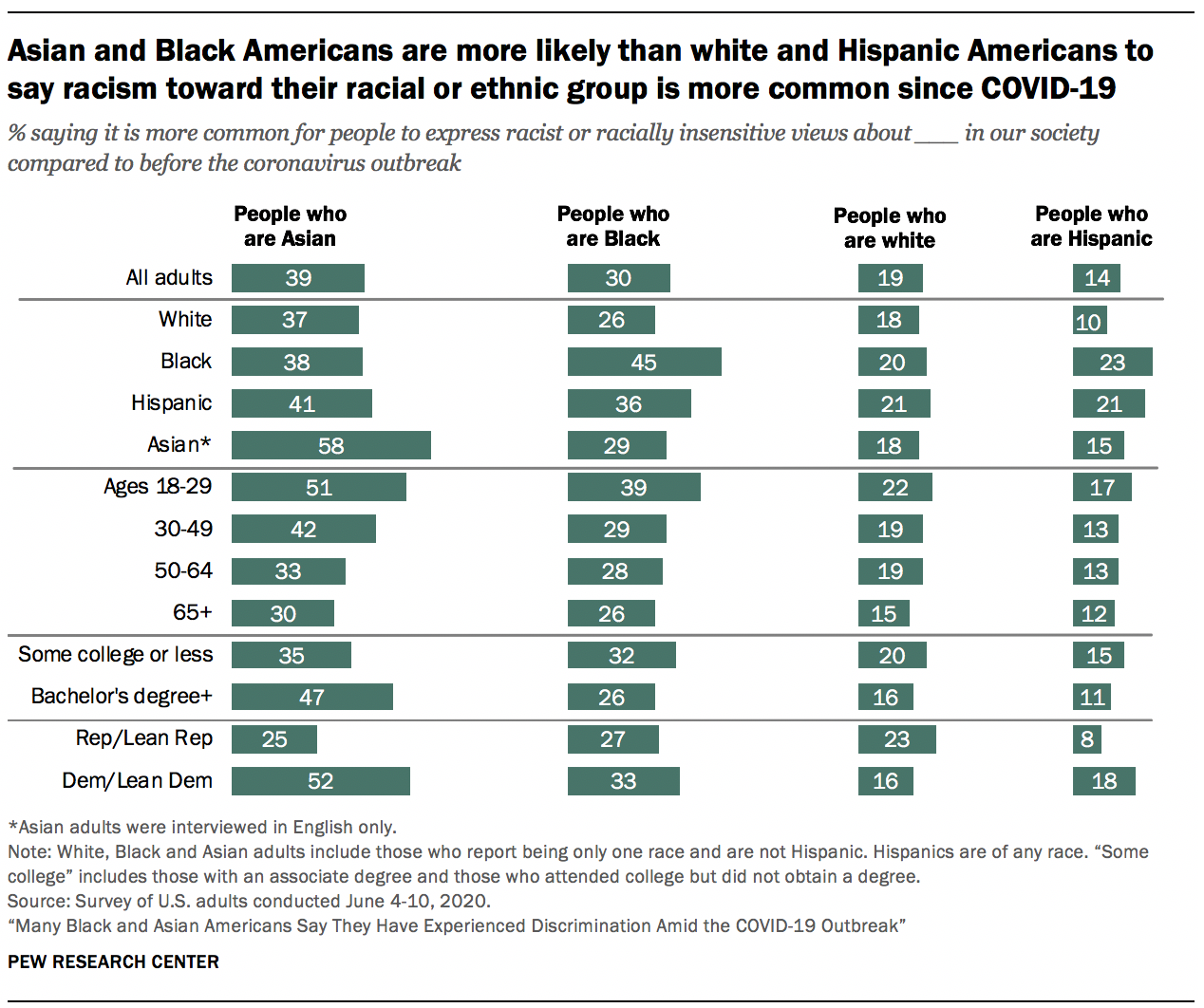
Democrats and those who lean Democratic (52%) are more likely than Republicans and Republican leaners (25%) to say that it is more common for people to express racist views about Asian Americans since the coronavirus outbreak. This partisan gap is narrower when it comes to views about whether it is now more common for people to express racist views about people who are Black (33% of Democrats vs. 27% of Republicans say this) or Hispanic (18% vs. 8%). Meanwhile, Republicans (23%) are more likely than Democrats (16%) to say that it is more common for people to express racially insensitive views about white people.
Terminology
"center" - Google News
July 02, 2020 at 01:02AM
https://ift.tt/2Zrq1x5
Many Black, Asian Americans Say They Have Experienced Discrimination Amid Coronavirus - Pew Research Center's Social and Demographic Trends
"center" - Google News
https://ift.tt/3bUHym8
https://ift.tt/2zR6ugj
Bagikan Berita Ini














0 Response to "Many Black, Asian Americans Say They Have Experienced Discrimination Amid Coronavirus - Pew Research Center's Social and Demographic Trends"
Post a Comment